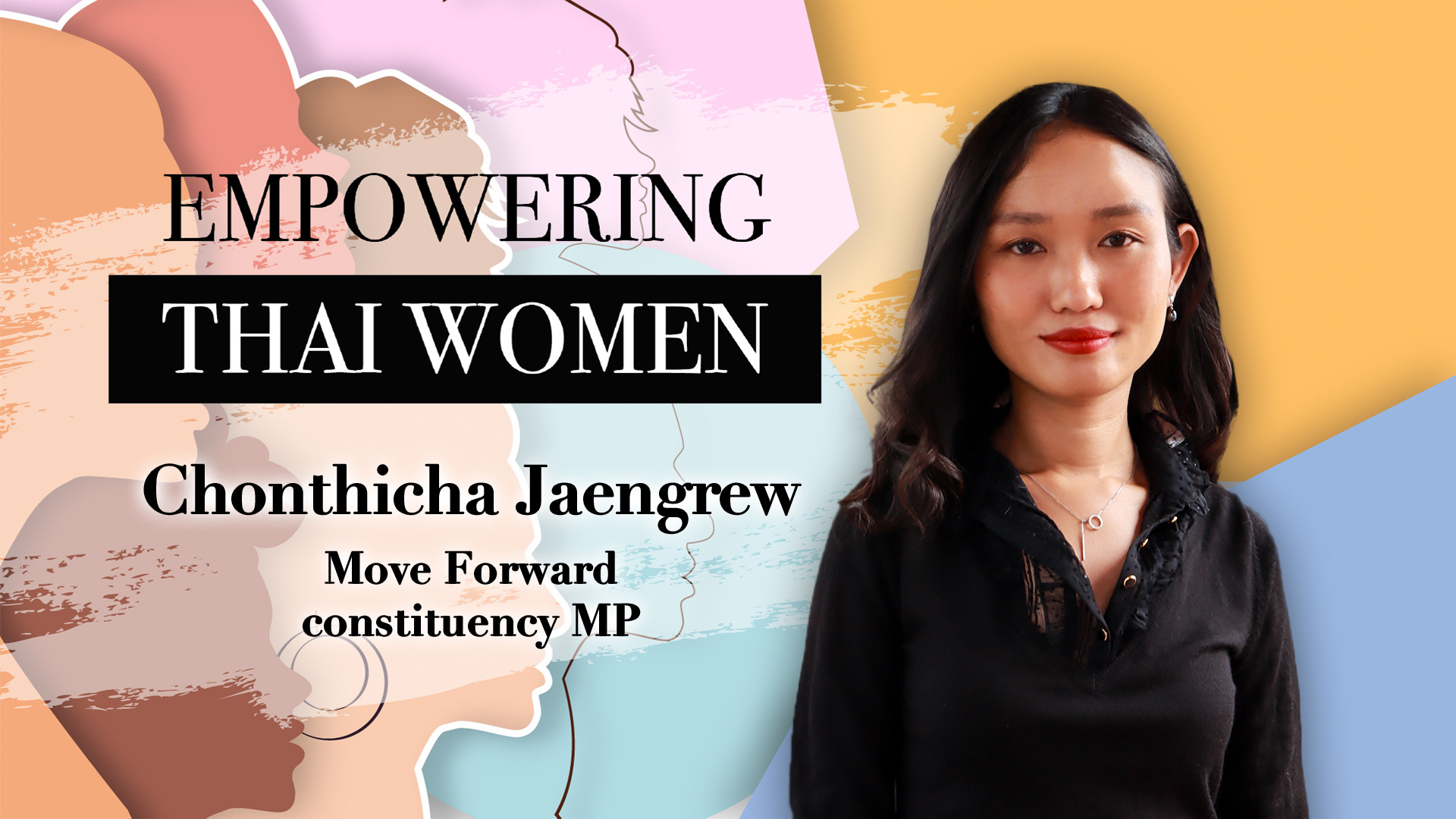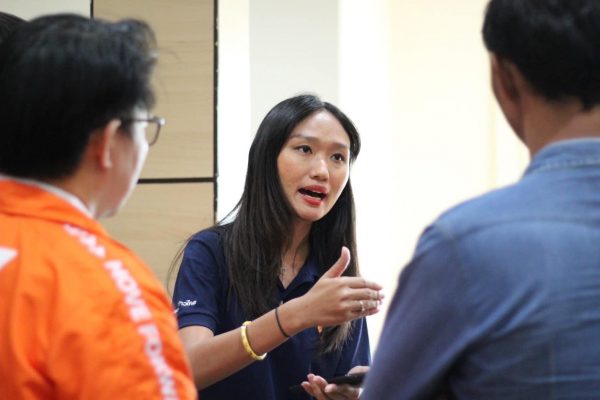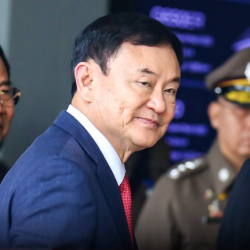It’s not our fault for being born female – Chonthicha Jangrew, Move Forward Party MP

TW: online sexual harassment, cyberbullying
“Two days after we won the elections in May 2023, I received messages on Facebook, which were in English, with photos of me edited into nude images, saying that he wanted to rape me or wanted to have sex with me.”
Move Forward Party MP, Chonthicha Jangrew, recalls encountering online sexual exploitation, which she says ruined her self-confidence and made her insecure over her public image. She also questions why society has to use gender to attack women, especially those who have a strong determination to bring about changes in Thai politics.
“As a woman, who lives in Thailand and is often harassed and exploited by society, of course this emphasises my vulnerable status and increases my lack of trust in the state, whether it can really protect me as a woman who wants to take part in Thai politics.”
Feeling unsafe
Chonthicha first came to public attention as an anti-government protester on the streets. Chonthicha became a student activist in 2015, when she took part in demonstrations against military rule. She also took part in the student-led protests in 2020-2021, particularly with the anti-establishment Ratsadon group, which demanded the resignation of then-prime minister Prayut Chan-o-cha, redrafting of the Constitution and amendment of the lèse majesté law.
Like many other political protesters, Chonthicha was hit with lèse majesté and sedition charges (Sections 112 and 116 of the Criminal Code), along with other charges such as violating the state of emergency decree and illegal public assembly. Having already encountered a series of challenges and difficulties as a political protester, Chonthicha also had to endure online sexual harassment and cyberbullying.
“Of course, I went through things other political protesters who are men do, whether it was political prosecutions, being spied upon by state officials, or even violence against protesters. For female political protesters, though, people use gender as a weapon to harass us and try to destroy our human dignity,” she says
Some of the incidents still haunt her, as if they happened yesterday.
One notable example was in 2016, when a doctored photo of a lady wearing an orange shirt, to pay respects to the late King Bhumibol, circulated online. As a result, Chonthicha became the subject of a witch hunt by netizens, who mistakenly believed that it was her in the shirt. Some also went as far as sending funeral wreaths to her house and posted online threats to sexually assault her.
“That wasn’t me,” she explained, while noting that, in those days, when neither “fake news” nor “misinformation” were buzzwords like today, netizens were quick to judge someone, especially those in the public eye, based on only one photo and without verifying the facts.

The horrendous ordeal wasn’t over. Chonthicha found herself trying to escape another witch hunt in 2021, after a fake text exchange between her and a “high-ranking official” at the U.S. Embassy circulated online, which misled netizens into believing that she had engaged in a sexual relationship with the official, to pave the way for the U.S. to interfere in Thai politics.
Two days after the Move Forward party won the May 2023 general election, in which Chonthicha became a constituency MP for Pathum Thani province, online haters continue to attack her with edited nude images of her and even threats to sexually abuse her.
“These things made me realise that, while being a pro-democracy activist and politician, who wants to play a part in Thai politics, was already difficult, it’s even more difficult as a female,” she said
Having to deal with such attacks for many years not only ruined her self-confidence, but made her question her own public image. Such traumatic events made her feel unsafe, which eventually took a toll on her mental health. Chonthicha disclosed that she suffered from PTSD (post-traumatic stress disorder) after having to deal with a series of hateful and sexually degrading messages for an extended period.
The hardest pill to swallow for Chonthicha was, however, the justice system, which she says has hurt her deeply. The former activist recalled that, when she filed a report with the police, she was told that she had to gather all the evidence by herself, which meant she had to revisit a long list of distressing messages and experience the same trauma all over again. Therefore, she feels that the justice system should be more sensitive to sexual harassment victims.
“Whenever I look back at the justice system here, I realise that these people and the process itself hurt me the most. That was really difficult for me, especially when I really wanted to make changes, so that no one would ever have to go through the same thing I’ve gone through. Whenever I look back, it makes me feel that I’m fighting all by myself,” she recalled.
Regardless, the activist-turned-politician feels lucky to have been surrounded by her friends and family, who truly understood her. At the same time, the awareness among citizens of democracy, human rights and even gender equality have increased significantly, especially since the protests in 2020. This, she says, fortified her and encouraged her to keep fighting.

Navigating gender bias
Although surviving online attacks was already traumatic for Chonthicha, navigating gender bias and prejudice brings additional challenges. Since she became a constituency MP, Chonthicha has often been stereotyped as inexperienced and naïve, because of her age and her gender, as she has been surrounded by other local politicians who are mostly older men.
“You know that I’ve been working so hard to prove myself as qualified to be an MP,” she said.
“Despite the fact that I’m a woman and young, I do have the determination. Most importantly, I have a good understanding of vulnerable groups in Thai society, whether they be women, the youth, the disabled or the disadvantaged, and I know what they want. This is what I’ve been trying to do, whether it’s the policies or working with the people, so that people know that, even though I’m a young woman, I am ready to be an MP who represents the people.”
Even though female participation in Thai politics has increased, Chonthicha feels that gender bias and online sexual harassment against female politicians persists. While noting that Thai politics seem to be more open to people of various groups, she feels that some people still believe that politics should be reserved for men. In fact, nearly half of the people around the world still believe that men are better political leaders than women, according to the UNDP’s Gender Social Norms Index in 2023.
In terms of image, the Move Forward MP also feels that it is somehow women’s responsibility to be “well-behaved” and to fit social standards to survive in a male-dominated culture. In fact, she thinks that Thai society should never push the responsibility of fitting into the societal standards of a Thai “lady” or a “modest” woman onto female politicians.
“What Thai society should really do, and should have done ages ago, is eliminate gender bias through education and create the right mind set about gender equality, from our younger generation to justice officials, state officials and the country’s leaders. This is what we should have done, not passing the responsibility to women,” she says.
While imposing a gender quota in the Thai parliament may be necessary to ensure gender equality, what Chonthicha thinks is much more important is a quota for those who truly understand the problems surrounding gender and are willing to push appropriate policies.
“I think these things will help reduce the gender gap. Once we can reduce that gap, it will reduce the obstacles that prevent women from joining politics,” she explains.
As for the policies she wants to promote, to ensure a better quality of life for Thai women, among the top policies are increasing maternity leave from 90 days to 180.
“I strongly believe that women are often expected to take the role of a mother and a wife, and that has prevented them from taking up work opportunities. So, if we increase opportunities for women at work, provide them work and financial freedom, it would really be a good start,” she says.

It’s not our fault for being a woman
Despite a long list of struggles, Chonthicha has developed resilience and gained inner strength. Whenever she looks at herself in a mirror, she reminds herself of her worth and that she must stand up for herself and others. Most importantly, Chonthicha often tells herself that it’s not her fault for being a woman and no one should ever feel that way.
“Now, it is time to reclaim our space together, raise our voices against those in positions of power and Thai society who still think that there is no space for women in politics and show them that women are as capable as others and that we are ready to make changes in our country and pass on the future to our children,” she proclaims.
By Nad Bunnag, Thai PBS World






